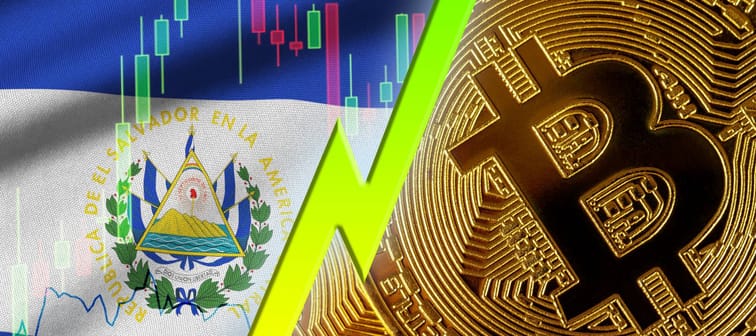Why is El Salvador adopting Bitcoin?

In El Salvador and many other countries, Bitcoin is already a legal method of payment, assuming the recipient accepts it. But in a few months, El Salvador will require all merchants to accept it if they have the technology to do so.
Salvadoran President Nayib Bukele signed the law on June 9 with the stated goal of modernizing the country’s economy. "This will generate jobs and help provide financial inclusion to thousands outside the formal economy,” Bukele said at the 2021 Bitcoin Conference in Miami.
Ben Weiss, CEO of CoinFlip, an ATM provider for cryptocurrency in the U.S., says a large portion of the Salvadoran population — as much as 70% — doesn’t have access to traditional banking, making it a natural fit for Bitcoin.
“You have high unbanked and underbanked populations; you have tremendous wealth inequality; and you have generations of people used to inflation and hyperinflation,” Weiss says. “Latin America intuitively gets Bitcoin and cryptocurrency in a way that other places don't because of the history.”
The Central American nation of about 6.5 million people relies heavily on remittances: money sent to Salvadoran citizens from family members and friends working abroad. Remittances made up a fifth of its gross domestic product in 2019, according to World Bank data.
Weiss and other supporters say using cryptocurrency could make sending money home faster and avoid common fees.
A better online investing experience
Easy to use and powerful, Qtrade's online trading platform puts you in full control with tools and resources that help you make well-informed decisions.
Invest NowWhat are the risks?

Dante Mossi, president of the Central American Bank for Economic Integration, is “very optimistic,” adding in a statement that he trusts El Salvador will work to ensure that the currency is a secure form of payment for its citizens.
But critics say the move could complicate discussions El Salvador has been having with the International Monetary Fund (IMF) about a $1 billion loan program.
“This may just reflect a long-term initiative or maybe even just a flashy PR tactic,” Siobhan Morden, an analyst specializing in Latin America at Amherst Pierpont Securities, said in a Reuters report.
“However, it shows lack of coordination with impulsive announcements that contradict a cohesive economic plan.”
IMF spokesperson Gerry Rice says officials are following the developments closely.
“The adoption of Bitcoin as legal tender raises a number of macroeconomic, financial and legal issues that require very careful analysis,” Rice said in a June 10 press briefing.
Could it happen here?

Weiss says Bitcoin is already catching on in North America for large purchases. Tesla briefly accepted the cryptocurrency in the U.S. earlier this year and had plans to expand the payment option to other countries.
“You’re not going to see it for a $4 Starbucks, but you'll see it for buying a house or a car,” Weiss says.
Yet other Latin American countries will likely become more open to crypto as part of their financial systems long before their northern neighbours ever do, Weiss says.
Because Bitcoin isn’t regulated like traditional currencies, many governments worry about the potential for money laundering and tax evasion. The Canadian government currently doesn't recognize cryptocurrencies as legal tender and warns Canadians about the risks associated with using digital currency, including a lack of protection or insurance, vulnerability to fraud and the currency's volatility.
The Bank of Canada is actually building the capability to distribute a cash-like digital currency of its own should the need arise. Still, the central bank says it would have no reason to do so unless traditional bank notes fade from use or alternative digital currencies become the norm.
For now, Canadian interest in Bitcoin is primarily investment-driven because of its volatility. Thousands of people became millionaires as Bitcoin surged to an all-time peak of $63,000 U.S. in mid-April — though the currency has lost about 40% of its value since then.
Unexpected vet bills don’t have to break the bank
Life with pets is unpredictable, but there are ways to prepare for the unexpected.
Fetch Insurance offers coverage for treatment of accidents, illnesses, prescriptions drugs, emergency care and more.
Plus, their optional wellness plan covers things like routine vet trips, grooming and training costs, if you want to give your pet the all-star treatment while you protect your bank account.
Get A QuoteIs Bitcoin worth investing in?

It depends. Giant swings in value are not for the faint of heart, and without proper precautions, losing money is a very possible outcome. Bitcoin investing also comes with fewer protections than other types of investments and is not insured by the government.
That said, famous investors like Paul Tudor Jones and financial gurus like Suze Orman like the idea of keeping a small percentage of your portfolio in crypto. If you’re eager to buy some Bitcoin, you can do so in four easy steps.
Canadians who aren’t quite ready — or are devotees of Warren Buffett, who despises it — have plenty of other investment options.
One popular app lets you invest in a diversified portfolio using only your “spare change.” Based on your unique financial goals and tolerance for risk, the app will recommend the portfolio that’s best suited for you.
Or if you're an active trader, you can sign up for an app that uses artificial intelligence to help you find prime opportunities to buy and sell.
Trade Smarter, Today
Build your own investment portfolio with the CIBC Investor's Edge online and mobile trading platform and enjoy low commissions. Get 100 free trades and $200 or more cash back until March 31, 2025.








